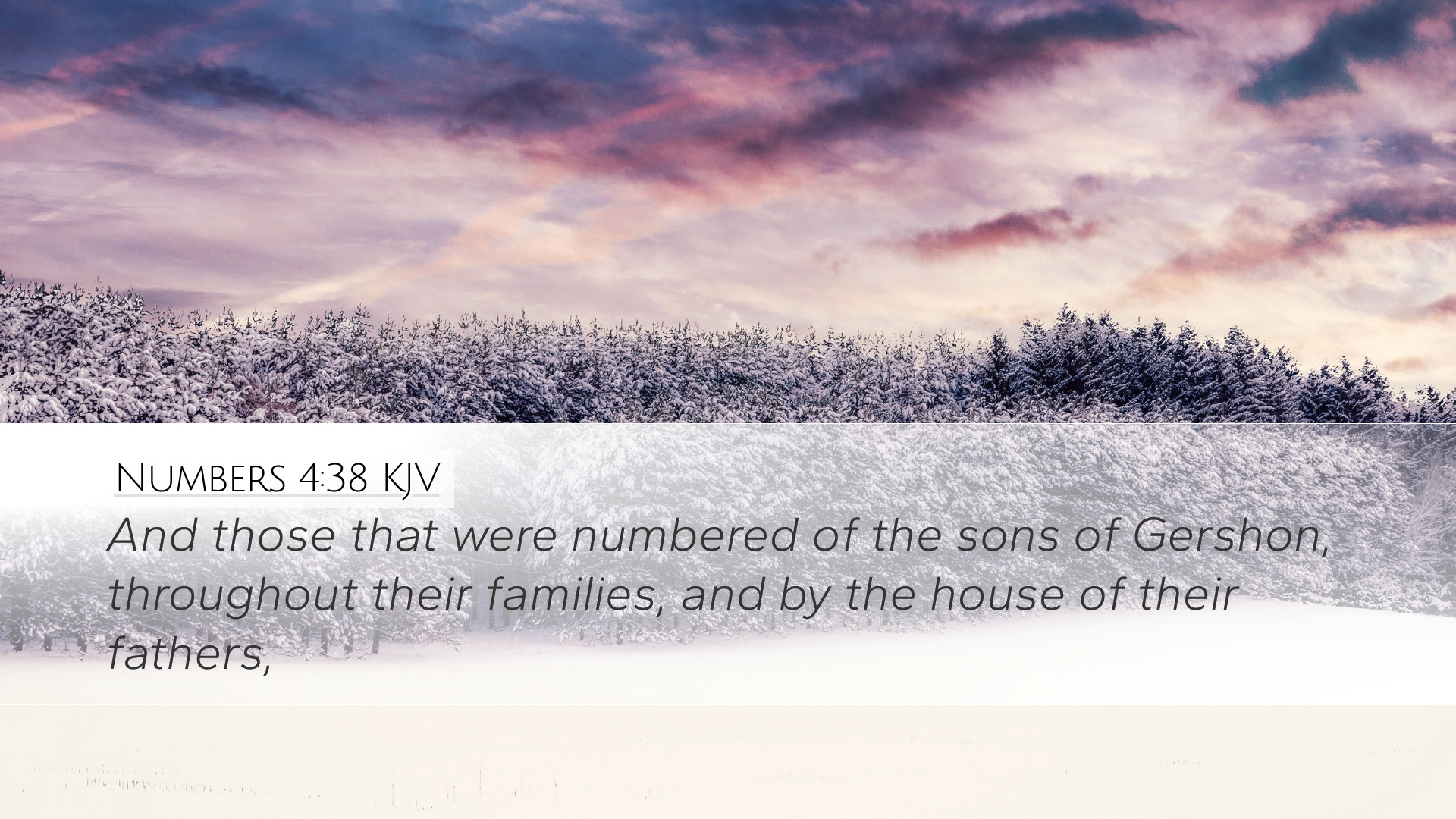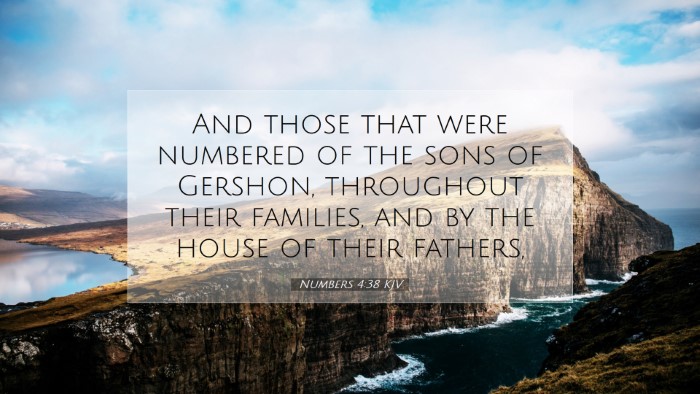Commentary on Numbers 4:38
Verse: “And those that were numbered of the children of Gershon, throughout their families, and by the house of their fathers, were thirty thousand and two hundred.”
Introduction
This verse occurs within a critical section of the Book of Numbers, which outlines the organization and responsibilities of the Levitical families. The Gershonites, descendants of Levi through Gershon, are identified here and their significant role in the transport and care of the Tabernacle is highlighted. This commentary will explore various facets and insights derived from public domain sources such as Matthew Henry, Albert Barnes, and Adam Clarke.
The Context of Numbers 4
The fourth chapter of Numbers is focused on the duties of the Levites in relation to the Tabernacle. The children of Gershon were tasked with the care of the tent, its coverings, and its service apparatus. This task reflects God's intention to construct a holy space among His people, demonstrating His desire for order, reverence, and the importance of community engagement in worship.
Insights from Commentators
Matthew Henry's Commentary
Understanding of the Numbers: Matthew Henry observes that the number 32,200 represents not just individuals but families and the collective strength of the Gershonites. This number indicates a substantial workforce dedicated to divine service, symbolizing the importance of community in fulfilling God's commands.
Significance of the Gershonites: Henry emphasizes the special role of the Gershonites in transporting the Tabernacle coverings and all that was required for worship. Their ministry underscores the importance of proper preparation and reverence in the practice of faith, highlighting that every role in the service of God is valuable and essential.
Albert Barnes' Notes
Family Structure and Duties: Barnes notes that the enumeration of the Gershonites illustrates the structure within the Levitical families. He explains that family organization was vital for efficient service in the transport of the Tabernacle. Each family had specific duties, which cultivated an accountability system for the entire community.
The Theme of Divine Order: Furthermore, Barnes remarks on the divine order in how the Levites were organized. This meticulous arrangement not only served a practical purpose but was also imbued with spiritual significance, emphasizing that God values organizational structure in His service, suggesting that disorder is not befitting of divine worship.
Adam Clarke's Commentary
The Total Count: Clarke takes note of the precision in the census of the Gershonites. He reflects on how divine directives require careful counting and acknowledgment of each individual’s contribution to God’s work. The number demonstrates the commitment of this tribe to the Tabernacle's ministry.
Transitional Role: Clarke also expounds on the transitional role that the Gershonites play in the broader narrative of the Israelites' journey. Their service is symbolic of the transition from slavery in Egypt to a liberated and structured community serving God. This serves as a reminder of the necessity of maintenance and stewardship in faith communities.
Theological Implications
This verse provides insight into theological principles central to the narrative of Israel. First, the counting of the people signifies God's intimate knowledge of His people. Second, it underscores the significance of service in worship: every family and individual plays a role in the community and their dedication is a form of worship.
Lessons for Today
- Community Involvement: Like the Gershonites, the involvement of every church member is crucial in the life of the church. Each individual's contributions, no matter how small, are vital to the health and function of the congregation.
- Divine Order: The insistence on orderly service reminds modern-day believers that God desires order in worship and community. This calls for introspection regarding how congregations can enhance their structure for spiritual growth.
- Faithfulness in Service: The diligence of the Gershonites serves as a model for faithfulness in service. It encourages believers to commit themselves to the tasks given to them within their communities, however large or small.
Conclusion
Numbers 4:38 serves not just as a record of numbers, but as an important reminder of the structure, service, and reverence involved in the worship of God. Drawing from the insights of biblical commentators, we can discern the depth behind these figures and their implications for the faith community. As pastors, students, theologians, and scholars delve into this passage, may they find inspiration to foster a deeper understanding of divine order and community participation in their respective ministries.


